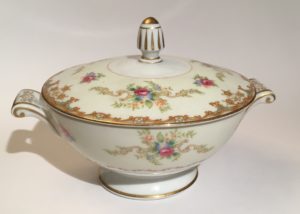Thanksgiving can wrap us in a swirl of recollections: autumn colors, savory flavors, delicious smells, and the sweet voices of persons long departed. The powerful memories start each Thanksgiving for me when I cradle my mother’s china, each chip bearing its own history.
 My mother treasured her china. Cream colored, delicately floral, with a gold rim, it certainly was not fancy: Regal, by Sango, was a modestly priced pattern widely available after World War II. I don’t know if she bought it all at once or in pieces. I wouldn’t have known even to ask that question. Nor could I have appreciated what it meant for someone with her impoverished heritage actually to have a set of china.
My mother treasured her china. Cream colored, delicately floral, with a gold rim, it certainly was not fancy: Regal, by Sango, was a modestly priced pattern widely available after World War II. I don’t know if she bought it all at once or in pieces. I wouldn’t have known even to ask that question. Nor could I have appreciated what it meant for someone with her impoverished heritage actually to have a set of china.
We used it at most 5 or 6 times a year: Christmas, New Year’s, Easter, plus the rare occasion when we might have a guest. And of course Thanksgiving. Otherwise it sat in Mamma’s modest, but treasured faux Queen Anne china closet—the one that now stands in my dining room.
Thanksgiving was the best of all holidays as far as I was concerned. Not long enough to get bored, devoid of the inevitable Christmas disappointments and tensions, with two precious days off school to boot! Aunts, cousins, and even some neighbors came. My parents were not social, so seeing this much bustle in our house was astonishing.
And the meal? It was Mamma’s best! We couldn’t appreciate how hard she worked back in that small kitchen, waging the campaign that allowed turkey dinner to appear on those gold-rimmed plates. No one was allowed to help her, either, because we “wouldn’t do it right.”
When my mother died in 1998, one of my first impulses was to replace the chipped serving pieces of her china. It was not a rational decision. I had my own china.
But I wanted her back! Her exhausting seven-year battle with cancer had been horrible for her, for all of us. I knew I could never again embrace that feisty, tiny, magnificent woman who had done so much to bless my life. The next closest thing seemed to be addressing her china, and making it whole again.
So I called one of those china replacement companies—wondrous places back in the days before eBay. The nice lady on the phone said “I bet you just lost your mom, didn’t you?” Surprised, I asked how she knew that. She said it was very common for women to do what I was doing, precisely for that reason. The prices of the replacement pieces shocked me, but it didn’t matter. I ordered them. And, irrationally kept the chipped ones.
Fortunately most of my mother’s gifts didn’t come in porcelain form and thus could never be chipped. Many were poems and hymns. One particular hymn text written before the turn of the 20th century by a little-known poetess named Ethel Wasgatt Dennis has remained my favorite. The poem goes nicely with the Thanksgiving season. For that matter, I haven’t found a single day yet when it does not apply, or when I’m not better off for singing it.
A grateful heart a garden is,
Where there is always room
For every lovely, Godlike grace
To come to perfect bloom.
Gratitude can be a worrisome thing. Slippery, even. Many of us can recall painful situations in our lives where our gratitude was not expressed sufficiently. The thank-you note not written, the gift not sent, the helpful gesture not extended or returned. Those memories can weigh heavily on our souls. It seems to me, though, that we heal such sadness by expressing gratitude now. And by recognizing and esteeming the palliative power of gratitude.
Gratitude and inspiration are deeply linked. One of the best cures I know to frustration, disappointment, exhaustion, or dismay is gratitude. It’s the antidote that helps turn I’m tired, I’m mad, No one is helping me, and I can’t do this into How blessed I am to be able to be here, right now, doing whatever it is.
The second verse of the text reflects another, often overlooked, quality of gratitude that we sometimes forget: gratitude’s strength.
A grateful heart a fortress is,
A staunch and rugged tower,
Where God’s omnipotence, revealed,
Girds man with mighty power.
Gratitude can turn dark into light within an instant. Gratitude lifts burdens, and opens shuttered doors. Gratitude dissolves sorrow and invites in joy. No, it cannot solve or fix everything. But it has intense power to soothe many a complex or baffling situation.
I was always surprised that, during those long years of my mother’s illness, she continued to sing the text of this hymn. But she knew gratitude to be one thing that not even the most awful disease could erase in her. She tried to teach that lesson to me. And I hope I have passed it on.
We’re about to embark on a series of meaningful holidays: Thanksgiving, Advent, Christmas, New Year’s, and Epiphany. Each of us will have ample challenges with long lists of obligations and duties. May we each remember that gratitude can be tucked into the tiniest pocket or woven into the narrowest crevice. Let us grow accustomed to drawing upon the strength and vitality that gratitude affords. And may each of you be bathed with the blessing of a grateful heart.



